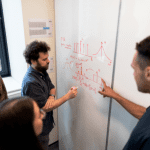
A facilitator leads a group of participants to solutions that are created, understood, and accepted by all. Effective facilitation cannot be achieved without the role of people and social sciences. Understanding Likert scales as a viable technique is necessary to improve qualitative assessments, including risk assessments, condition assessments, and prioritization.
Likert scales were originally developed by Rensis Likert, who was concerned with measuring psychological attitudes and wished to do this in a “scientific” way. Specifically, he sought a method to produce attitude measures that could reasonably be interpreted as measurements on a proper metric scale, such as a thermometer.
[Read more…]












